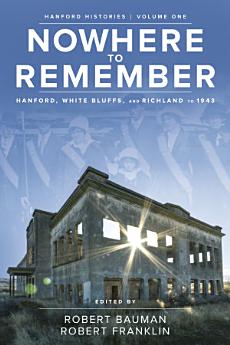Nowhere to Remember: Hanford, White Bluffs, and Richland to 1943
About this ebook
“First time I ever tasted cherries or even seen a cherry tree was [in White Bluffs]. Or ever ate an apricot or seen an apricot...It was covered with orchards and alfalfa fields.”--Leatris Boehmer Reid
Euro-American Priest River Valley settlers turned acres of sagebrush into fruit orchards. Although farm life required hard work and modern conveniences were often spare, many former residents remember idyllic, close-knit communities where neighbors helped neighbors. Then, in 1943, families received forced evacuation notices. “Fruit farmers had to leave their crops on their trees. And that was very hard on them, no future, no money...they moved wherever they could get a place to live,” Catherine Finley recalled. Some were given just thirty days, and Manhattan Project restrictions meant they could not return.
Drawn from Hanford History Project personal narratives, Nowhere to Remember highlights life in Hanford, White Bluffs, and Richland--three small agricultural communities in eastern Washington’s mid-Columbia region. It covers their late 1800s to early 1900s origins, settlement and development, the arrival of irrigation, dependence on railroads, Great Depression struggles, and finally, their unique experiences in the early years of World War II.
David W. Harvey examines the impact of wagon trade, steamships, and railroads, grounding local history within the context of American West history. Robert Franklin details the tight bonds between early residents as they labored to transform scrubland into an agricultural Eden. Laura Arata considers the early twentieth century experiences of women who lived and worked in the region. Robert Bauman utilizes oral histories to tell forced removal stories. Finally, Bauman and Franklin convey displaced occupants’ reactions to their lost spaces and places of meaning--and explore ways they sought to honor their heritage.
About the author
Robert Bauman received his PhD from the University of California, Santa Barbara. He is a Professor of History at WSU Tri-Cities. His research interests are in the areas of race and ethnicity in the American West and poverty and public policy.
Robert Franklin is the Hanford History Project Assistant Director and Lecturer in the Washington State University Tri-Cities History Department. He received his MA in Public History from Washington State University, and specializes in U.S. history, historic preservation, and archival science.
Series Editor Michael Mays is a Professor of History at WSU Tri-Cities and the Hanford History Project Director.





